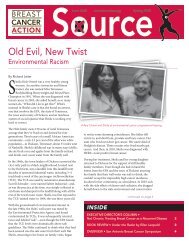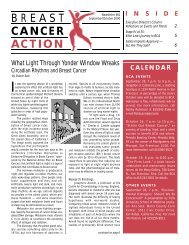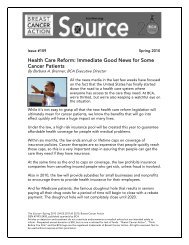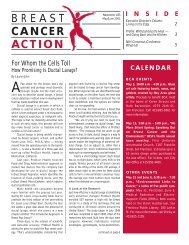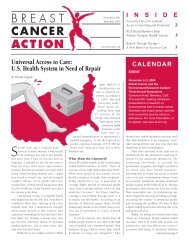CHANGING THE CONVERSATION - Breast Cancer Action
CHANGING THE CONVERSATION - Breast Cancer Action
CHANGING THE CONVERSATION - Breast Cancer Action
Create successful ePaper yourself
Turn your PDF publications into a flip-book with our unique Google optimized e-Paper software.
health. Having successfully worked to pass legislation supporting<br />
the precautionary principle in government policy,<br />
we continued to push for regulations implementing that<br />
principle, helping to stop cancer where it starts and relying<br />
on the strength that comes from working side by side with<br />
others.<br />
BCA also worked with other organizations to write, produce,<br />
and distribute a 41-page report summarizing the vast amount<br />
of research data linking synthetic chemicals to breast cancer.<br />
“State of the Evidence: What Is the Connection Between<br />
Chemicals and <strong>Breast</strong> <strong>Cancer</strong>?” introduced a five-point plan<br />
to reduce cancer-causing chemicals in our bodies and our<br />
environment. BCA helped organize a presentation for a California<br />
senate committee in February and went to Sacramento<br />
with other environmental health activists to urge state lawmakers<br />
to act on the evidence cited in the report.<br />
The long-awaited release of results from the ten-year Long<br />
Island <strong>Breast</strong> <strong>Cancer</strong> Study in 2002 also helped bring BCA’s<br />
concerns about environmental links to breast cancer to the<br />
forefront of public debate. While the study results proved<br />
disappointing to many breast cancer activists, BCA took the<br />
opportunity to point out (in op-eds and articles about the<br />
report) that the study not only showed a link between breast<br />
cancer and polycyclic aromatic hydrocarbons (PAHs)—toxins<br />
created by cigarette smoke, motor vehicle exhaust, and<br />
smoking or burning meat—but also indicated the type of<br />
further research that will help us understand why so many<br />
of us are getting sick.<br />
BCA also played a key role in convening the first International<br />
Summit on <strong>Breast</strong> <strong>Cancer</strong> and the Environment,<br />
funded by the Centers for Disease Control and Prevention<br />
(CDC). The event, held in Santa Cruz, California, in June,<br />
brought together for the first time international researchers,<br />
community members, and breast cancer and environmental<br />
health advocates to work toward new approaches to breast<br />
cancer research and policy, emphasizing the value of including<br />
the community as a partner in all aspects of planning<br />
and implementation.<br />
BUILDING STRENGTH THROUGH COALITIONS<br />
Combining forces to promote true breast cancer prevention<br />
was also the goal behind our work with Prevention First,<br />
a coalition of independent health organizations working to<br />
shift the emphasis in disease prevention away from drugs<br />
and procedures that put human health at risk. Members of<br />
the coalition conveyed public health concerns at several<br />
medical and scientific conferences around the country this<br />
year, including the U.S. Department of Defense <strong>Breast</strong> <strong>Cancer</strong><br />
Research Program’s Era of Hope conference, the annual San<br />
Antonio <strong>Breast</strong> <strong>Cancer</strong> Symposium, the World Conference on<br />
<strong>Breast</strong> <strong>Cancer</strong>, and the American Society of Clinical Oncology’s<br />
annual meeting. We also worked to strengthen public dialogue<br />
on the dangers of direct-to-consumer advertising and<br />
the importance of the precautionary principle in public health<br />
policy through media outreach. Our efforts resulted in letters,<br />
op-eds, and commentary in newspapers and magazines<br />
throughout the United States and Canada, including the<br />
Atlanta Journal-Constitution, the Nation, and National Public<br />
Radio’s “Marketplace.”<br />
IDENTIFYING NEW ISSUES<br />
Of course, major shifts in thinking require time to take root,<br />
and as some of BCA’s longtime efforts to educate the public<br />
about the realities of breast cancer finally reached the mainstream<br />
in 2002, we worked to create space for further change<br />
in the breast cancer movement. BCA launched a campaign in<br />
2002 to encourage the public to think about breast cancer<br />
fundraising in an entirely different light, opening up a broad<br />
new dialogue around the disease and pushing for greater corporate<br />
accountability.<br />
As mainstream corporate promotions for <strong>Breast</strong> <strong>Cancer</strong> Awareness<br />
Month urge consumers to cook, clean, and shop for the<br />
cure, BCA’s newest campaign—Think Before You Pink—urges<br />
individuals to think twice before supporting the ubiquitous<br />
cause-related marketing gimmicks. In October we launched<br />
a new web site, www.thinkbeforeyoupink.org, and took out<br />
an ad in the national edition of the New York Times highlighting<br />
corporate “pinkwashers” that exploit breast cancer<br />
to sell their products. The campaign—whose launch generated<br />
coverage by a wide range of media outlets, including NBC’s<br />
“Nightly News,” CNN, USA Today, and the Wall Street Journal—<br />
encourages consumers to look critically at corporate claims of<br />
“doing good.”<br />
On one level, Think Before You Pink takes corporations to<br />
task for profiting from people’s emotions around the disease.<br />
At the same time, the campaign teaches people that as long<br />
as they believe they’re doing something meaningful about<br />
breast cancer by buying into corporate marketing schemes,<br />
the real work that needs to be done to achieve more effective<br />
treatments, true prevention, and universal access to care will<br />
continue to be underfunded and ignored. Ultimately, the<br />
campaign is a call for a revamped and coordinated breast<br />
cancer research agenda.<br />
FOLLOWING <strong>THE</strong> MONEY<br />
Think Before You Pink is an extension of BCA’s work to track<br />
and report the real story behind the money flooding into<br />
the cause, which made great strides on other fronts. Our campaign<br />
to make cosmetics giant Avon more accountable in the<br />
way it raises and distributes its breast cancer funds achieved<br />
a major victory in 2002: the company dropped its association<br />
with a for-profit production company that ate up a large<br />
portion of the money raised by participants in its huge fundraising<br />
walks, and the production company went out of business<br />
soon afterward.<br />
BCA continues to urge Avon to fund research into true breast<br />
cancer prevention and to fund organizations most in need in<br />
the regions that host its walkathons, instead of draining the<br />
resources of those communities and putting them into large<br />
medical centers that are already tremendously well funded.<br />
And we’ve developed new materials—brochures, postcards,



